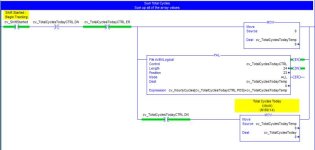I have an array with 24 elements in it and 3 shifts in a day. The elements represent downtime for each hour in the day. I want to add the various element of the array for each shift period. For example:
Elem 0-7 A shift
Elem 8-15 B shift
Elem 16-23 C shift
Is there a function that will execute on a single scan to pick out the correct hours and add them up? I am using Logix5000 on a Contrologix PLC.
Elem 0-7 A shift
Elem 8-15 B shift
Elem 16-23 C shift
Is there a function that will execute on a single scan to pick out the correct hours and add them up? I am using Logix5000 on a Contrologix PLC.





